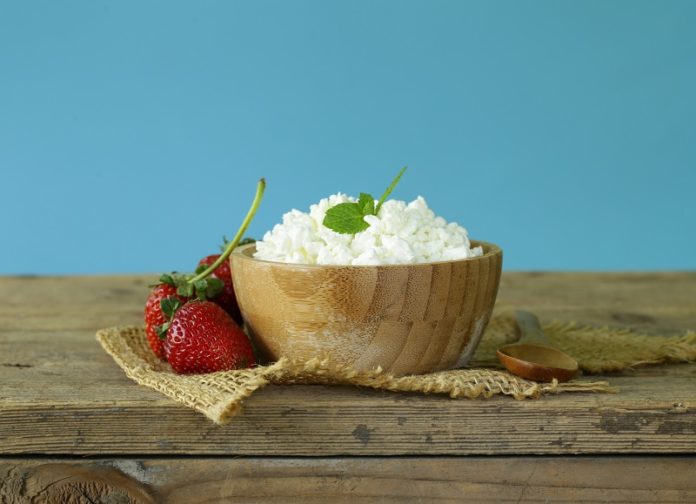Ever wonder who buys and enjoys eating cottage cheese? It’s one of those items that seem to languish on grocery shelves. Or it gets relegated to the diner menu’s back page as “scoop with fruit platter.” But times are indeed changing for this dairy product, and its nutritional benefits are regaining notice. Just as many people got excited about Greek yogurt a few years back, they are discovering the health benefits and versatility of cottage cheese.
The “Whey” of the Future?
Both cottage cheese and Greek yogurt result from a fairly simple process. Curdle milk, drain the whey, and you get cottage cheese, in the aptly named small or large curd varieties. For yogurt, add bacterial cultures to heated and cooled milk, then ferment until thickened. Strain it to remove the whey, and it becomes Greek yogurt. You can often use both products interchangeably on pancakes or waffles, as part of dips or cheesecakes, or mixed with nuts, granola, or fruit. By the way, note that if you make either of these at home, you can use the leftover whey for smoothies, soups, pasta water, and other tasty recipes.
Greek yogurt’s moment in the spotlight caught the attention of new and old cottage cheese manufacturers. Muuna, Artisa, and Good Culture occupy the dairy aisle with eye-catching cup designs now competing with revamped Breakstone’s and Knudsen. According to Appetite for Health, one of several media outlets promoting the food’s benefits, cottage cheese joins the “Hottest Nutrition Trends of 2018.” The list echoes the December 2017 Washington Post article highlighting the Food & Nutrition Conference & Expo’s predictions. Additionally, cottage cheese has now become a Pinterest favorite.
The Nutritional Scoop on Cottage Cheese vs. Greek Yogurt
So how do these neighbors in the dairy case measure up in nutritional value? Previously, I’ve cautioned my readers about carefully checking the labels on yogurt packaging. Often packed with artificial sweeteners and colors, yogurt products vary widely. I’ve also pointed out that there are no regulations on when a company can call its yogurt “Greek.” That being said, the following figures provide a rough comparison of cottage cheese to Greek yogurt.
Eight ounces of regular cottage cheese provides approximately:
- 160 calories
- 8g carbs
- 10g fat
- 6g sugar
- 26g protein
- 188mg calcium
- 822mg sodium
Compare that to eight ounces of plain Greek yogurt with:
- 120 calories
- 10g carbs
- 1g fat
- 8g sugar
- 22g protein
- 250mg calcium
- 81mg sodium
As you can see, Greek yogurt wins out on most counts, especially sodium. However, remember to read labels carefully as not all of these products are created equally. For comparison, let’s look at a low-sodium, low-fat cottage cheese. According to the Prairie Farms website, their low-fat variety contains 80 calories and 12g of protein per serving. (They consider a 4 ounces a serving, so that’s similar to the numbers above.) But they make it with sea salt, so it contains about half the sodium of their regular cottage cheese. And it contains just 1% milkfat compared with 4% in their regular variety.
Should You Include More Cottage Cheese in Your Diet?
Base your choice upon your health, activity level, and how much you need to strictly monitor sodium intake. The recommended daily allowance for healthy adults is no more than 2,300 mg., so a cup of cottage cheese gives you over a third of this.
Keep in mind that nutritional breakdowns may vary between name brands, and of course between low-fat, non-fat, and flavored versions of cottage cheese and Greek yogurt. Apply the information the same way you would when incorporating any food into your diet, whether as a healthy snack, an ingredient substitute, or part of a meal.
The high amount of casein protein in cottage cheese makes it appealing for building muscles, as well as for post-workout muscle recovery. Its slow digestion may help you curb cravings, and if eaten shortly before bed, help you sleep better. Additionally, some brands are fortified with the B. bifidum and L. acidophilus cultures commonly found in yogurts, so you can still reap those benefits with cottage cheese.
Remember, too, that you will only stick with eating something if you actually enjoy it, so pick what you like!
See How Cottage Cheese Benefits You
If getting enough probiotics is your concern, consider a supplement like Diamond Nutritionals’ Probiotic Formula or Ultra Probiotic Formula Packets. These supplements are great for maintaining balance of healthy bacteria in your body.
If cottage cheese sounds like a good fit for your lifestyle, give it a try. Watch for added sugars, experiment using it in different recipes, and see how it fits into your personal dietary goals. Whether cottage cheese remains a trend or not, do what works for you, and makes you feel your best.








